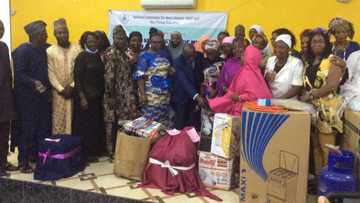AfCFTA: Local Content Drive Key to Deepening Sustainable Growth in Africa, Says Wabote
- The Nigerian Content Development and Monitoring Board has now moved local content in Nigeria to 42 percent
- This is from the less than five percent that it was before the enactment of the Local Content Act in 2010
- The board's executive secretary, Engr Simbi Wabote has asked other African countries to emulate Nigeria in this regard
Texas - Executive Secretary of the Nigerian Content Development and Monitoring Board (NCDMB) Engr Simbi Wabote, has stressed that African countries must leverage the robust platform and opportunities presented by African Continental Free Trade Area (AfCFTA) agreement.
According to him, the agreement is key to driving home the local content narrative to achieve sustainable growth and development in Africa.

Source: Twitter
Wabote made the call while speaking during the African Local Content Collaboration Session at the ongoing Offshore Technology Conference (OTC) in Houston Texas, USA.

Read also
18 FCT residents get empowerment starter packs as FG moves to improve adult literacy in Nigeria
While commending the foresight of the league of African leaders that adopted the AfCFTA agreement in 2012, he noted that the AfCFTA has become an enabler for deepening African local content practice beyond national borders to enable project delivery and development of natural resources.
PAY ATTENTION: Subscribe to Digital Talk newsletter to receive must-know business stories and succeed BIG!
Speaking on the theme: 'Cross-Border Service Integration As Enabler Of Project Delivery In The African Oil And Gas Industry', the NCDMB boss noted that the AfCFTA is:
"Africa's move to harmonize its markets for economic integration across all 55 member states with the objective of tapping into the Gross Domestic Product of over $3trillion."
He noted that with the official commencement of AfCFTA, and the focus on addressing some of Africa's "teething" problems, the prospect of opportunities among African businesses is gathering momentum, thus, Africa must not be left behind in developing its own response to the prevailing challenges.
Engr Wabote commended the Petroleum Technology Association of Nigeria (PETAN) and other key stakeholders for bringing together participants to this year's OTC to have a robust strategy session on African Local Content:
''Especially against the backdrop of the ongoing energy transition narrative and the shifting dynamics of the security of energy supply across the globe."
He added:
"From Kenya to Malawi, from Uganda to Nigeria, and all over the continent. I have always seen AfCFTA as the practice of Local content at the continental level."
During his presentation, Wabote said to drive local content in the oil and gas industry, and any other sector, six key parameters must be looked at.
He listed them as regulatory framework, gap analysis, capacity building, funding and incentives, research and development, and access to market.
Wabote told the gathering that the NCDMB has now moved Local Content in Nigeria to 42 percent from the less than five percent that it was before the enactment of the Local Content Act in 2010.
He, therefore, urged African nations and businesses to take advantage of the opportunities and platforms provided by the AfCFTA.
Stakeholders call for robust funding to salvage Africa’s oil & gas industry
Meanwhile, stakeholders in Africa’s Oil and Gas industry gathered in Lagos on Monday, March 7 at the African Local Content Investment Forum.
The event had three technical sessions structured around eliciting discussions among stakeholders on the future of the oil and gas industry in the continent.
Experts agree that there was a need to develop a new business model for the development of the hydrocarbon sector in the continent.
Niger Delta: Youths, stakeholders task state govts on human capacity building
In a related development, as part of conscious efforts to change the negative narrative of Nigeria’s oil-rich Niger Delta region, young professionals have tasked governors of the region to invest more in human capacity building.
They also advised the governors to create purposeful opportunities for young people, especially entrepreneurs.
They further advocated that governments of the region must move away from the political tradition of just signing and awarding contracts, to strategic empowerment and support for innovative creative minds in the region.
Source: Legit.ng





